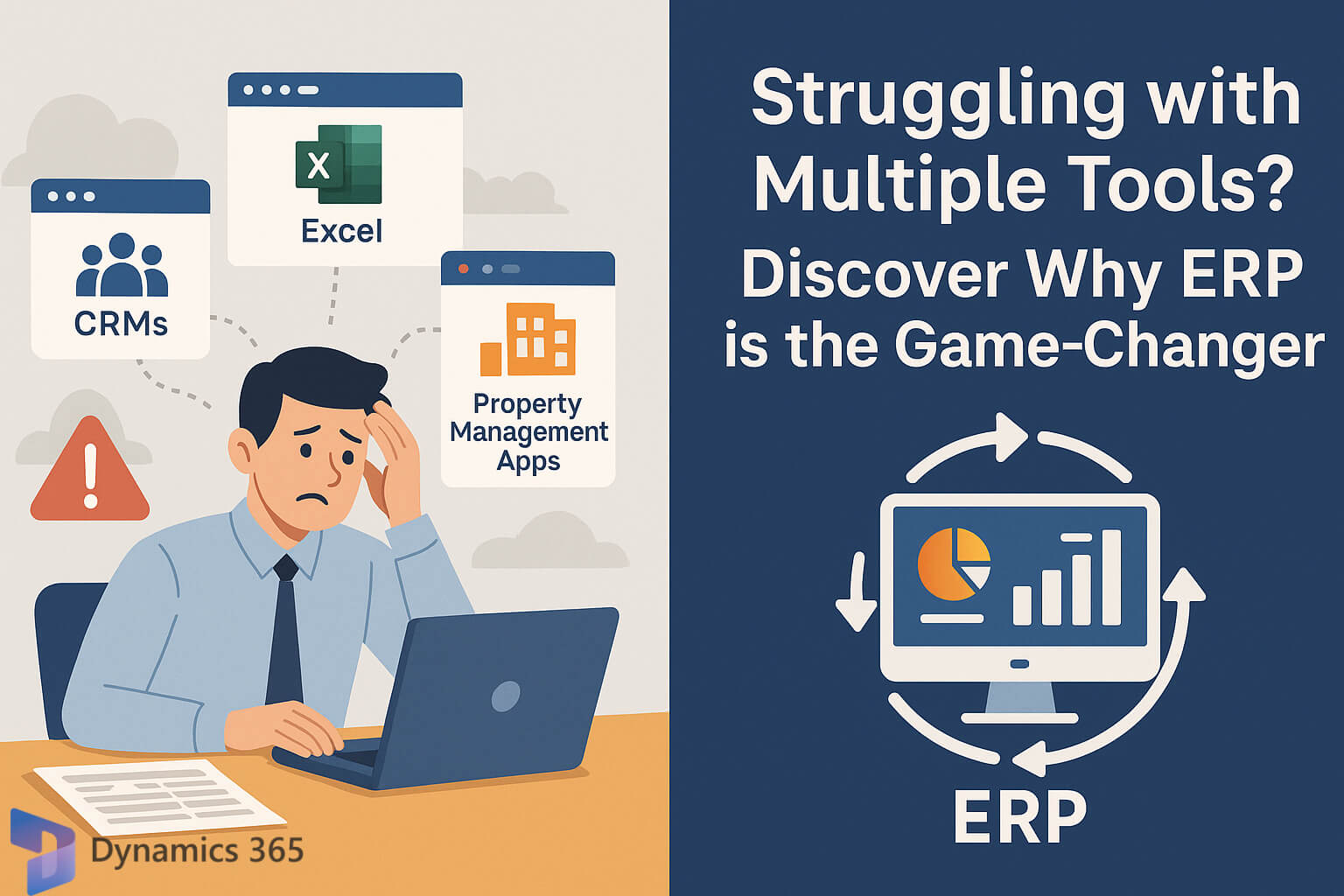Struggling with Multiple Tools? Discover Why ERP is the Game-Changer

Strong 8k brings an ultra-HD IPTV experience to your living room and your pocket.
Struggling with multiple tools? Discover why ERP is the game-changer. Learn how ERP systems like Dynamics 365 streamline operations, enhance compliance, and eliminate software silos.
The Problem with Multiple Disparate Tools
In today's fast-paced business environment, many organizations rely on a mix of software tools—Excel spreadsheets, customer relationship management (CRM) systems, property management applications, and more. While each tool serves a specific function, this patchwork approach often leads to:
- Data Silos: Information is scattered across platforms, making it difficult to obtain a unified view of operations.
- Manual Processes: Employees spend countless hours transferring data between systems, increasing the risk of errors.
- Compliance Challenges: Inconsistent records and missed data can lead to compliance issues and costly fines.
When audit time arrives, these challenges become even more pronounced, turning the process into a chaotic scramble.
How ERP Systems Bridge the Gap
Enterprise Resource Planning (ERP) systems, such as Microsoft Dynamics 365, offer a comprehensive solution by integrating various business processes into a single, cohesive platform. Here's how ERP systems address the challenges posed by multiple disparate tools:
1. Centralized Data Management
ERP systems consolidate data from various departments, providing a single source of truth. This centralization ensures that all stakeholders have access to consistent and up-to-date information, facilitating better decision-making.
2. Automated Compliance and Reporting
With built-in compliance features, ERP systems automate the tracking and reporting of regulatory requirements. For instance, Dynamics 365 offers:
- Audit Trails: Detailed logs of all transactions and changes, aiding in transparency and accountability.
- Real-Time Reporting: Immediate access to financial and operational reports, ensuring timely compliance.
- Regulatory Alignment: Tools to help adhere to standards like GDPR, HIPAA, and SOX.
3. Enhanced Operational Efficiency
By automating routine tasks and streamlining workflows, ERP systems reduce manual labor and minimize errors. This efficiency leads to:
- Time Savings: Employees can focus on strategic tasks rather than data entry.
- Cost Reduction: Decreased need for multiple software licenses and maintenance.
- Scalability: Easier adaptation to business growth and changing needs.
Dynamics 365: A Closer Look
Microsoft Dynamics 365 stands out as a robust ERP solution, offering a suite of features designed to enhance business operations:
- Integrated Modules: From finance and sales to customer service and supply chain management, all modules work seamlessly together.
- Cloud-Based Accessibility: Access your data anytime, anywhere, facilitating remote work and global operations.
- Advanced Security: Built-in security measures protect sensitive data and ensure compliance with industry standards.
Real-World Impact
Organizations that have transitioned to ERP systems like Dynamics 365 report significant improvements:
- Reduced Audit Preparation Time: Automated reporting and centralized data simplify the audit process.
- Improved Data Accuracy: Elimination of manual data entry reduces errors.
- Enhanced Decision-Making: Real-time insights enable proactive strategies.
Visualizing the Transformation
To better understand the shift from multiple tools to a unified ERP system, consider the following images:
Before ERP Implementation:
- A cluttered workspace with multiple software interfaces open.
- Employees are manually transferring data between systems.
After ERP Implementation:
- A streamlined dashboard displaying integrated data.
- Teams collaborate efficiently with real-time information.
Audit Process Simplified:
- Automated reports are generated with a single click.
- Compliance checklists are being completed effortlessly.
Enhanced Security Measures:
- Visuals of data encryption and secure access protocols.
- Alerts and monitoring dashboards ensure data protection.
Frequently Asked Questions
Q1: What is an ERP system?
An ERP (Enterprise Resource Planning) system is a software platform that integrates various business processes, such as finance, human resources, and supply chain management, into a unified system.
Q2: How does ERP improve compliance?
ERP systems offer automated compliance features, including audit trails, real-time reporting, and regulatory alignment tools, ensuring adherence to industry standards and reducing the risk of fines.
Q3: Is Dynamics 365 suitable for small businesses?
Yes, Dynamics 365 offers scalable solutions tailored to businesses of all sizes, allowing small businesses to start with essential modules and expand as needed.
Q4: How does ERP enhance operational efficiency?
By automating routine tasks and centralizing data, ERP systems reduce manual labor, minimize errors, and streamline workflows, leading to increased productivity.
Q5: What are the cost implications of implementing an ERP system?
While the initial investment may be significant, ERP systems often lead to long-term cost savings through improved efficiency, reduced errors, and decreased software maintenance expenses.
Q6: Can ERP systems be customized to specific business needs?
Absolutely. ERP systems like Dynamics 365 offer modular designs, allowing businesses to select and customize functionalities based on their unique requirements.
Conclusion
Transitioning from a fragmented software environment to a unified ERP system like Microsoft Dynamics 365 can revolutionize your business operations. By centralizing data, automating compliance, and enhancing efficiency, ERP systems address the challenges posed by multiple disparate tools, positioning your organization for sustained success.
Note: IndiBlogHub features both user-submitted and editorial content. We do not verify third-party contributions. Read our Disclaimer and Privacy Policyfor details.


